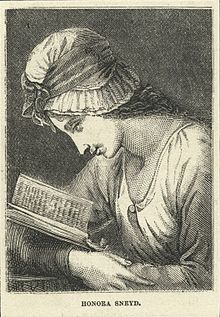Honora Sneyd | |
|---|---|
 | |
| Born | 1751 Bath, Somerset, Kingdom of Great Britain |
| Died | 1 May 1780 (aged 28–29) Weston-under-Lizard, Staffordshire, Kingdom of Great Britain |
| Resting place | Weston-under-Lizard, Staffordshire, United Kingdom |
| Nationality | British |
| Occupations |
|
| Spouse | |
| Children |
|
| Parents |
|
| Relatives | |
Honora Edgeworth (née Sneyd;[b] 1751 – 1 May 1780) was an eighteenth-century English writer, mainly known for her associations with literary figures of the day particularly Anna Seward and the Lunar Society, and for her work on children's education. Sneyd was born in Bath in 1751, and following the death of her mother in 1756 was raised by Canon Thomas Seward and his wife Elizabeth in Lichfield, Staffordshire until she returned to her father's house in 1771. There, she formed a close friendship with their daughter, Anna Seward. Having had a romantic engagement to John André and having declined the hand of Thomas Day, she married Richard Edgeworth as his second wife in 1773, living on the family estate in Ireland till 1776. There she helped raise his children from his first marriage, including Maria Edgeworth, and two children of her own. Returning to England she fell ill with tuberculosis, which was incurable, dying at Weston in Staffordshire in 1780. She is the subject of a number of Anna Seward's poems, and with her husband developed concepts of childhood education, resulting in a series of books, such as Practical Education, based on her observations of the Edgeworth children. She is known for her stand on women's rights through her vigorous rejection of the proposal by Day, in which she outlined her views on equality in marriage.
- ^ Hopwood 1811a.
- ^ Hopwood 1811b.
- ^ Romney 2015.
- ^ Chamberlain 1910, Appendix II. Honora Sneyd and the 'Serena' pictures pp.386–389.
- ^ Adam's 2015, Portraits of Charlotte and Mary Sneyd, 1790.
- ^ Edgeworth & Edgeworth 1821b, p. 372.
- ^ a b MacDonald 1977, p. 273.
- ^ Burke 1871, ii: p. 1288.
- ^ King-Hele 2007, p. 527.
- ^ Fraser's 1832.
Cite error: There are <ref group=lower-alpha> tags or {{efn}} templates on this page, but the references will not show without a {{reflist|group=lower-alpha}} template or {{notelist}} template (see the help page).
